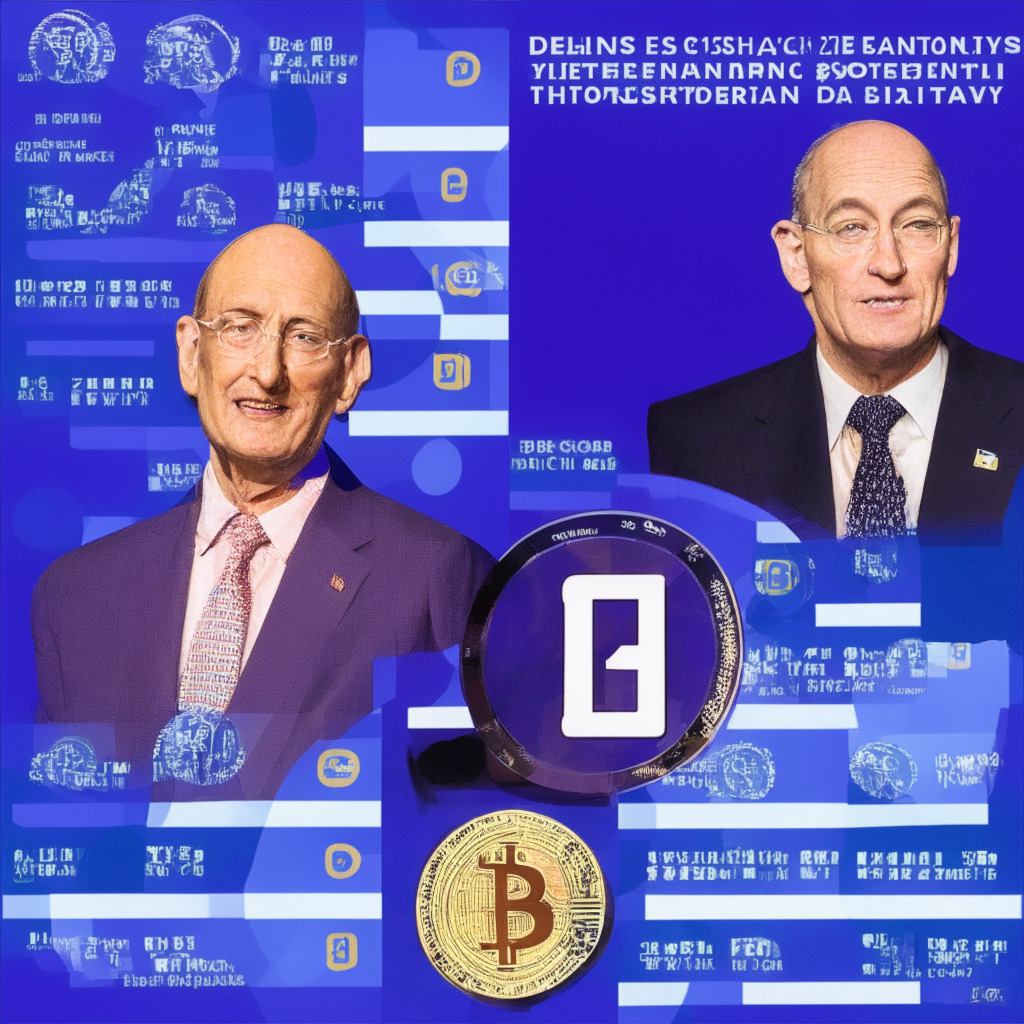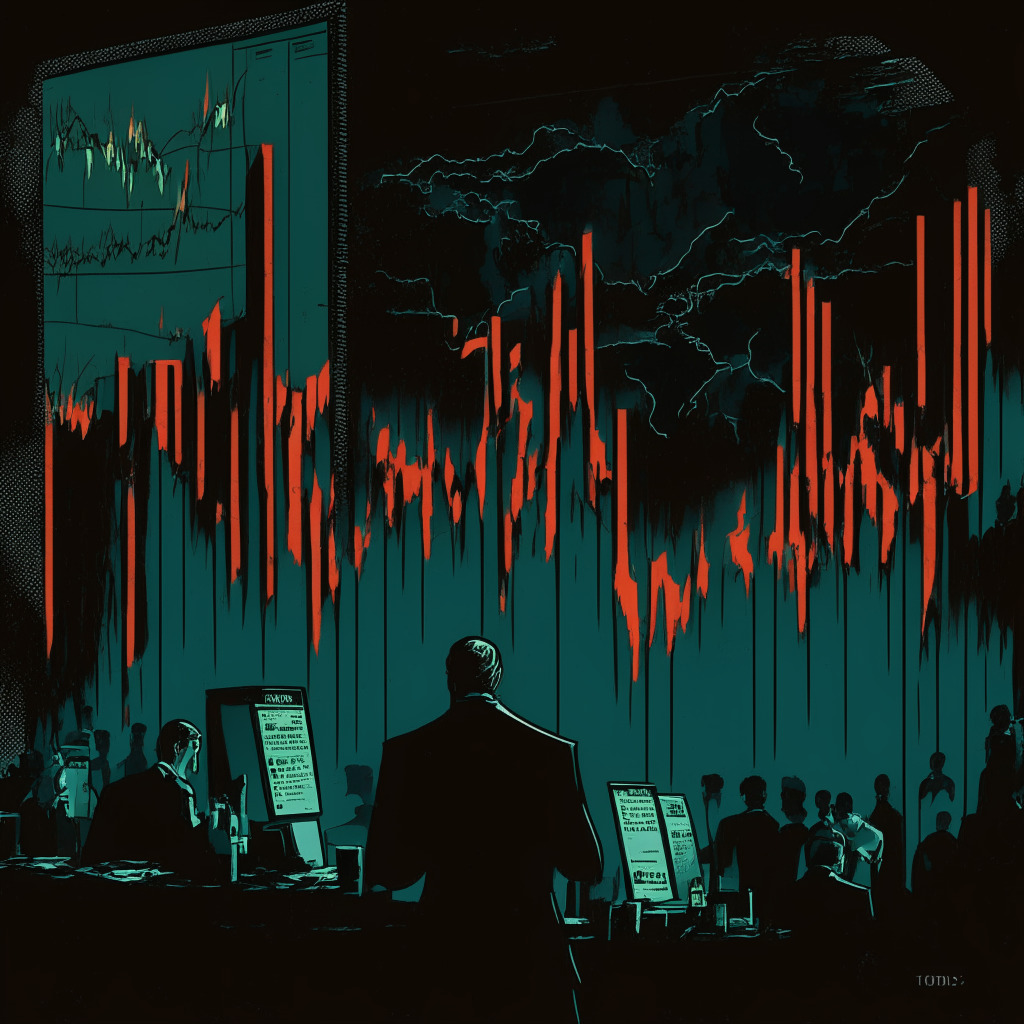US Treasury Secretary Janet Yellen supports SEC and CFTC enforcing cryptocurrency regulations for consumer protection. However, critics argue over-regulation may stifle innovation. With Congress yet to pass crypto legislation, the industry faces ongoing uncertainty surrounding the appropriate level of regulation.
Search Results for: Janet Yellen
Navigating the Tightrope: Striking Balance in Crypto Regulations with Key Insights from Gensler and Yellen
US Representative Maxine Waters seeks opinions from SEC Chair Gary Gensler and Treasury Secretary Janet Yellen on a legislative proposal to revise crypto market structure. Amid aggressive enforcement actions and lawsuits, the crypto sector seeks a balance between regulation, protecting investors, and fostering innovation. The outcome of these discussions could significantly impact future cryptocurrency regulations and market stability.
Treasury Secretary vs SEC: The Battle for US Crypto Regulation Clarity
Treasury Secretary Janet Yellen supports using enforcement tools to address risks in the digital currency ecosystem and seeks additional regulation. However, her stance contrasts with SEC Chairman Gary Gensler, who believes existing financial regulations suffice. The crypto industry awaits concrete guidelines amid ongoing debates and polarization.
Crypto Markets Tumble Amid US Debt Ceiling Fears and UK Inflation: Analyzing the Impact
Crypto markets faced a shake-up as concerns over UK inflation and Janet Yellen’s U.S. debt ceiling warning sent prices spiraling. The Federal Open Market Committee minutes revealed divided opinions on rate hikes, affecting investor confidence. Major cryptocurrencies, including Bitcoin and Ether, experienced significant declines, reflecting reduced investor optimism.
Debt Ceiling Deadline Hovers over Crypto Markets: The Impact on Bitcoin and Safe Investment Strategies
US Treasury Janet Yellen acknowledges financial market stress due to debt ceiling deal uncertainty, with potential dire consequences if a default occurs. Market analysts suggest that despite potential debt default, Bitcoin’s price spike may not happen as anticipated, calling for cautious investment strategies.
US Bank Mergers: Solving the Crisis or Creating Riskier Financial Giants? Debating Pros and Cons
US Treasury Secretary Janet Yellen discussed the possibility of more bank mergers amid the ongoing banking crisis. However, concerns arise over the growing power of financial giants, potentially posing a threat to Americans and the economy. The delicate balance between ensuring stability and preventing “too big to fail” institutions remains a challenge.
G7 Summit, Biden’s Disapproval & Crypto: Debating Tax & Regulation in Uncertain Times
During the G7 summit, President Biden criticized a debt deal for protecting wealthy tax cheats and crypto traders, while US Treasury Secretary Janet Yellen warned of catastrophic consequences if an agreement isn’t reached. This highlights ongoing tensions between supporting the expanding crypto market and ensuring fair responsibility, as the US debt ceiling deadline approaches and the future of crypto regulation remains uncertain.
Debt Default Fears & De-Dollarization: Russia’s Stance on the Shaky US Economy
Russia closely monitors the US economy amid debt default concerns and warnings by Treasury Secretary Janet Yellen. The ongoing crisis highlights economic system weaknesses, prompting countries like Russia to explore alternate solutions such as de-dollarization efforts and a potential common BRICS currency.
Impending US Debt Default: Impact, Uncertainty, and Urgent Bipartisan Efforts
U.S. Treasury Secretary Janet Yellen warns of a potential debt default by June 1, urging Congress to address the issue. A default could lead to severe economic hardships, damage global leadership, and impact national security. The May 9 bipartisan talks hold the key to understanding the urgency and potential repercussions, emphasizing the need for Congress to find a solution.
How US Regulations Can Spur Transparency In The Cryptocurrency Industry
“Senator Sherrod Brown has expressed concern about the cryptocurrency industry’s lack of self-regulation and transparency, predominantly benefiting insiders and executives. He urged key U.S. financial policy-makers to increase transparency and balance fostering innovation with protecting consumers in the crypto industry.”
Fitch Downgrades US Credit Rating: An Opportunity or Threat for Cryptocurrencies?
Fitch has downgraded the US government’s credit rating from AAA to AA+, sparking concerns of potential impact on the cryptocurrency market. Crypto enthusiasts suggest this demonstrates weakening traditional economic structures, advocating a transition to decentralized financial systems utilizing cryptocurrencies like Bitcoin and blockchain technology.
FedNow vs Cryptocurrencies: A Leap Towards Centralized Digital Finance or a Threat to Decentralization?
The US Federal Reserve’s new FedNow Service facilitates instant money transfers 24/7, which could be considered a challenge to cryptocurrencies known for similar features. However, cryptocurrencies’ decentralized nature, transparency, and immunity to manipulation or censorship present a stark contrast to traditional finance systems. Concerns arise as some view FedNow as a step towards Central Bank Digital Currency, potentially enabling government control over citizens’ lives.
Exploring the Potential for CBDCs to Disrupt Dollar Dominance in Global Trade
“Central bank digital currencies (CBDCs), inspired by Bitcoin protocol, have the potential to shift global economic dynamics. Adoption by countries like Brazil, UAE, Russia, Singapore, and China, accounting for one-fourth of global output, could stimulate de-dollarization, altering U.S. capital markets and geopolitical relations. CBDCs could enable direct international trade settlements, impacting the dollar’s hegemony.”
Digital Asset Market Structure: A Path for Crypto Regulation or Hindrance to SEC’s Authority?
House Financial Services Committee Chair Maxine Waters proposed the Digital Asset Market Structure bill, offering US-based digital asset exchanges a pathway for SEC registration, seeking regulatory clarity for the crypto industry. The legislation aims to approve digital securities, commodities, and stablecoins for trading while providing guidelines to distinguish between crypto-based securities and commodities.
Digital Asset Market Structure Bill: Innovation Boost or Regulatory Threat?
US lawmakers introduced the “Digital Asset Market Structure” bill, proposing a comprehensive framework for digital assets. California Rep. Maxine Waters seeks feedback on the bill’s potential impact on the regulatory landscape and investor protection, highlighting the importance of balancing innovation and investor security.
Crypto Regulation Wars: Terraform Labs, Stablecoins, and the Battle for Blockchain’s Future
Terraform Labs co-founder and former CFO face prison sentences and extradition due to fraud charges, highlighting challenges and regulatory uncertainties in the cryptocurrency industry. As stablecoins gain traction, striking a balance between fostering innovation and protecting investors is a pressing challenge for global regulators.
Balancing Privacy and Transparency: Pros and Cons of a US Central Bank Digital Currency
The U.S. Treasury Department explores Privacy Enhancing Technologies (PETs) to protect privacy and anonymity in potential digital dollar transactions. As the U.S. considers introducing a Central Bank Digital Currency (CBDC), addressing risks and striking a balance between privacy and transparency remain top priorities for policymakers.
Crypto Tax Compliance Pressure and North Korea’s Alleged Laundering: A Troubling Connection
The crypto industry faces increasing pressure for tax compliance as US Congress members urge Treasury and IRS to implement regulations. Meanwhile, funds from the $35 million Atomic Wallet hack are traced to Sinbad.io, allegedly involved in laundering over $100 million in cryptoassets.
Crypto Tax Regulations: Legitimizing the Industry vs Hindering Growth and Privacy
US Congressmen Brad Sherman and Stephen Lynch urge for crypto tax regulations, highlighting tax evasion concerns in the industry. Regulations could legitimize crypto and encourage adoption, but critics argue it may hinder growth and limit decentralization benefits.
US Default Averted: Market Optimism Fuels Crypto Rally and Debate on Future Prospects
US futures surged on Thursday as the House of Representatives passed a crucial deal averting a dangerous US default. Combined with hints of a pause in interest-rate hikes, this sparked optimism in the market. Positive trends were observed in S&P 500, Dow Jones Industrial Average, and Nasdaq Composite futures, while tech-heavy Nasdaq experienced a slight setback. The broader cryptocurrency market may also be impacted by this development.
Crypto Mining Tax Shelved: Balancing Innovation, Regulation, and Sustainability Debate
The proposed Digital Asset Mining Energy excise tax (DAME) on cryptocurrency mining is absent from the recent US debt ceiling deal, stirring debates. While proponents argue DAME could generate revenue and promote eco-friendly practices, critics warn against stifling the growing industry with taxes.
US Debt Ceiling Agreement Fuels Bitcoin’s Rally: Will the Bullish Trend Continue or Correct?
Bitcoin’s value sees an uptick amid US debt ceiling discussions, as a preliminary agreement is reached between President Joe Biden and Republican leader Kevin McCarthy. The debt ceiling agreement could impact the Federal Reserve’s money-printing activities, potentially benefiting Bitcoin due to its inverse trading relationship with the USD. However, a significant barrier at the $28,300 level may affect Bitcoin’s upward trajectory.
Crypto Market Surges Amid US Debt Ceiling Negotiations: Relief or Overconfidence?
Cryptocurrency prices received a boost as the likelihood of a US debt default seemed less probable. Bitcoin climbed 2.9%, Ethereum was up 1.4%, while altcoins like Cardano and Solana saw even bigger gains. Uncertainty remains regarding the debt ceiling situation and its potential impact on markets; crypto enthusiasts should remain vigilant and informed.
Debt Ceiling Crisis Looms: Potential Impacts on Crypto and Financial Markets
As the US faces a potential debt crisis, ongoing high-stakes discussions about raising the $31.4 trillion debt ceiling could impact financial markets, including the cryptocurrency sphere. Swift resolution of lingering issues is critical to avoid a widespread crisis and market uncertainty.
Debt Ceiling Deal Impact: Potential Market Volatility & Crypto Surge Ahead
Debt ceiling deal negotiations could bring massive volatility to financial markets. Traders are observing inflation data, progress in governmental discussions, and the potential 45% drop in stock prices if no agreement is reached. This could impact the crypto market, possibly causing a surge in prices.
US Debt Default Threat: Implications for Bitcoin, Ethereum, and Global Crypto Market
The U.S. risks its first-ever debt default, potentially impacting global markets and cryptocurrencies, including Bitcoin and Ethereum. Cryptocurrency markets face uncertainty, and the larger question is whether lawmakers can find a permanent solution to ease financial market tensions.
US Debt Ceiling Crisis: Impact on Crypto Markets and Blockchain Technology
The US faces a potential catastrophic default as President Joe Biden and Republican Kevin McCarthy urgently negotiate the debt ceiling. House Speaker McCarthy expresses optimism, with significant progress made during Wednesday’s talks. However, unresolved issues persist, causing tension in financial markets, including the crypto market. A deal failure by June 1st could result in severe consequences.
Crypto Market Slides as US Debt Ceiling Crisis Looms: Analyzing the Impact and Future
The crypto market cap slid 2% last week, with Bitcoin briefly dropping below $26k amid investor panic over the US’s negative credit rating watch due to debt ceiling talks. Major altcoins such as Ethereum, XRP, Cardano, Polygon, and Solana also experienced fluctuations near key support levels.
Montenegro Court Reversal: Terraform Labs’ Co-Founder Bail Denied Amid Crypto Controversy
A court in Montenegro repealed Terraform Labs co-founder Do Kwon’s release on bail, sparking controversy as allegations of forgery persist. The downfall of TerraUSD, their algorithmic stablecoin, highlights the importance of regulatory measures in the rapidly evolving crypto and stablecoin markets for global financial stability.
Debt Ceiling Fiasco: Bearish Future for Crypto and Global Markets Amid Economic Uncertainty
The ongoing uncertainty surrounding the debt ceiling deal, plunging stocks and cryptocurrencies, and FOMC minutes release induces panic among investors. Bitcoin price tumbles over 2%, altcoins follow suit, and the US dollar soars to a 2-month high. Amidst escalating inflation, interest rate hikes, and nervous markets, investors must remain vigilant in their decision-making and explore new opportunities.
Debt Ceiling Race Against Time: Market Crash, Crypto Volatility, and Averting Default
As the US faces a possible debt default, the Treasury Department explores options to prevent unprecedented consequences. Treasury officials are inquiring about delaying payments and using a potential surge in quarterly tax payments to extend the deadline. However, Treasury Secretary Yellen urges timely action from Congress to avoid calamity. Failure to reach a deal could trigger market crashes and recession, affecting equities and the crypto market.
US Debt Ceiling Dilemma: Impact on Crypto and Stock Markets, Weighing Pros and Cons
The US debt ceiling situation may significantly impact stocks and cryptocurrency markets, with potential “catastrophic” global consequences. The outcome could lead investors to sell off stocks and cryptocurrencies and purchase high-yield Treasury bills. However, Bitcoin may rally in the coming weeks amid a weakening US dollar dominance.































